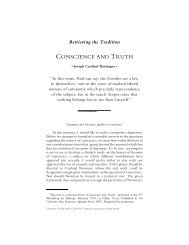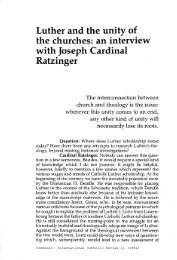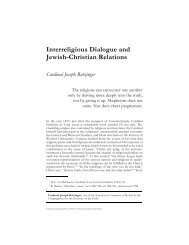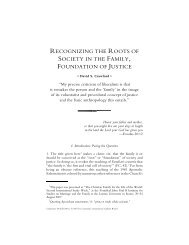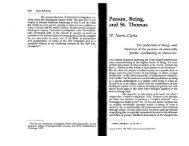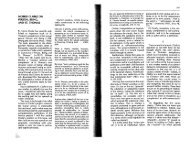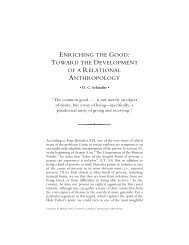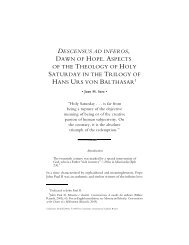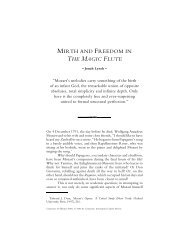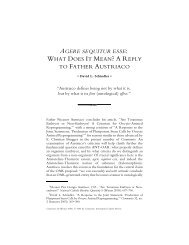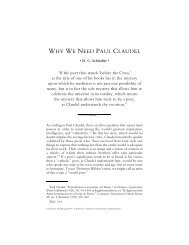Juan Sara. Secular Institutes According to Hans Urs ... - Communio
Juan Sara. Secular Institutes According to Hans Urs ... - Communio
Juan Sara. Secular Institutes According to Hans Urs ... - Communio
Create successful ePaper yourself
Turn your PDF publications into a flip-book with our unique Google optimized e-Paper software.
<strong>Secular</strong> <strong>Institutes</strong> 333<br />
fragmentation of meaning in which we find ourselves <strong>to</strong>day. The<br />
terminus of this his<strong>to</strong>rical apocalypse, the collapse of a self-defeating<br />
anthropocentric nihilism, reveals an express contradiction of the<br />
gratuity of Christian love. Balthasar’s hope is that, just as a negative<br />
“theological a priori” (the separation of reason and faith in order <strong>to</strong><br />
give space <strong>to</strong> the freedom of grace) closed the Christian era and<br />
opened the way <strong>to</strong> post-Christianity, so <strong>to</strong>day a theological a priori<br />
of the gratuity of love (that unites reason and faith in order <strong>to</strong> allow<br />
them <strong>to</strong> grow <strong>to</strong>gether concretely in the glory of their mutual selfdonation)<br />
might close from within the modern era and open a new<br />
Catholic theater of the world. 56<br />
What Balthasar is proposing with the secular institutes, then,<br />
is the possibility of embracing “from below” within the obedience<br />
of love the negative tendency operating in the West since the late<br />
Middle Ages, its visceral “No” <strong>to</strong> being assumed in Christ—thanks<br />
<strong>to</strong> the qualitative decisions of those called <strong>to</strong> an exclusive<br />
consecration of this obedience of love in representation of all. What<br />
is at stake is thus more than a mere critique from a distance: it is<br />
nothing less than a real, patient entrance in<strong>to</strong> the other in order <strong>to</strong><br />
participate in the substitutionary event of the decision of Christ<br />
himself. By the same <strong>to</strong>ken, the ultimate goal of the secular institutes<br />
is, in Balthasar’s conception, <strong>to</strong> foster an existential, eucharistic echo<br />
in present his<strong>to</strong>ry of that original dialogue between the triune God<br />
and Mary that we saw above. This dialogue is nothing other than the<br />
growth of the world in <strong>to</strong>tal gift <strong>to</strong> God, authentic worldly<br />
profession in Christian consecration, the flowering of the logos in<br />
the divine Logos, the fruitfulness of God in man.<br />
The destructive force of the post-Christian tendency <strong>to</strong>wards<br />
univocity and contradiction could therefore be transformed,<br />
Balthasar hopes, in the analogical rhythm of the Ever-More of<br />
that ‘so and so is’ in<strong>to</strong> the will that ‘so and so shall become that” (WzM, 849). “That<br />
this ‘gratuity’ [Umsonst] is the character of our present nihilism has still <strong>to</strong> be shown<br />
. . . . Duration, with a ‘gratui<strong>to</strong>usness,’ without an end and goal, is the most<br />
paralyzing idea, especially when one grasps that one is being fooled and yet has no<br />
power <strong>to</strong> keep from being fooled. Let us think this idea in its most terrible form:<br />
existence, as it is, has no direction and goal, but inevitably returns, without any<br />
finale in nothingness: ‘eternal return.’ That is the most extreme form of nihilism:<br />
nothingness (‘meaninglessness’) eternally!” (WzM, 853).<br />
56 Balthasar, Prologomena, 69–70.



